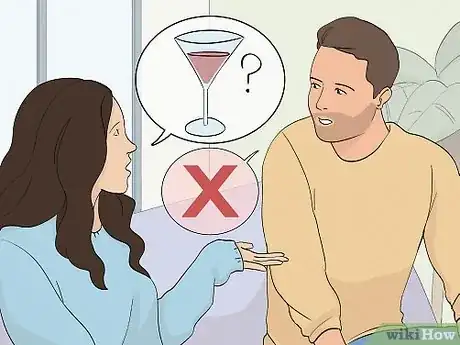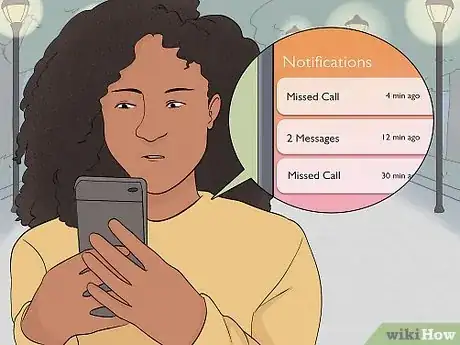This article was co-authored by Jay Reid, LPCC. Jay Reid is a Licensed Professional Clinical Counselor (LPCC) in private practice in San Francisco, CA. He specializes in helping clients who have survived a narcissistic parent or partner. Treatment focuses upon helping clients identify and challenge self-diminishing beliefs as a result of narcissistic abuse. Jay holds a BA in Psychology from the University of Pennsylvania and an MS in Clinical Psychology from Penn State University.
There are 9 references cited in this article, which can be found at the bottom of the page.
This article has been viewed 25,219 times.
Marriages are never perfect. They are filled with good times and bad, excitement and stress, and even arguments. Spouses are never going to agree on everything all of the time, so getting into heated discussions here and there are par for the course. However, there is a major difference between normal marital arguments and abuse. You can determine if your fighting is typical or abusive by examining if there is a pattern to the way your partner behaves, if they are controlling, and if you have changed as a result of the fights.
Steps
Looking for Patterns
-
1Consider the subject of your arguments. Abusers are typically more concerned about what benefits them, as opposed to what benefits the relationship. Are your arguments consistently about how your spouse puts themselves first ahead of you and your family? Do your fights have to do with circumstances that are out of your control, but that you are constantly being blamed for? If you notice a pattern behind the fights, it could be the beginnings of your spouse attempting to control you, which can be a form of abuse.
- Although every marriage is different, typical marital spats are usually resolved in a matter of hours or days. In the case of abuse, the fights can extend for weeks, months, or even years. The abuser will often emotionally torture the victim by never really getting over a fight, and holding it over their head.[1]
- For example, your partner might stay silent for days or weeks after an argument which leads to you feeling guilty and apologizing even though you were not wrong. This manipulation tactic of the "silent treatment" may be applied after every argument to keep you in line.
-
2Decide if your spouse has to win in your fights. Abusers want to have the upper hand in a marriage. Instead of attempting to see both sides of the argument and wanting to work it out, like those in a healthy marriage would tend to do, abusers just want to win at all costs. They will often resort to threats, name-calling, and mind games to get the job done.[2]
- Do you often feel like your spouse has to have the last word? For example, do you suggest you take a break in order to cool off but they refuse and continue to argue? This is a power trip associated with wanting to win or be in control.
- Reflect on past arguments that you have had and who ended up admitting they were at fault or apologizing. If it is always you, then this is a red flag.
Advertisement -
3Notice if your spouse behaves differently when you're alone. Abusers are good at schmoozing with other people in order to create the perfect image. They may cuddle up to you when others are around, or even laugh off something they actually find upsetting. Their behavior can change the minute you are alone, however, where your spouse will make you “pay” for what happened when the others were around.
- Having different personalities in private and public settings is an abuser’s way of showing dominance over you. When you’re out and see this glorified version of your spouse, you let your guard down. When you’re alone and the abusive personality comes out, you’re reminded quickly who has the upper hand in the relationship. Keeping you on your toes at all times is often part of an abuser’s game.[3]
- For example, your spouse dotes on you in front of your parents calling you "sweetheart" and "baby," but, at home, they call you ugly names like "idiot."
Determining if Your Spouse Tries to Control You
-
1Think about if your spouse tries to stop you from doing what you like. Behind their tough exteriors, abusers are typically weak and have low-esteem. They will often cause fights because they don’t want you to do the things you like. To them, you having passions and interest means you have a life away from them, which can make them feel very vulnerable. If your arguments are often caused because of something your spouse doesn’t want you to do, it could be abuse.
- Fighting over bills or the sharing of household chores are all typical marital fights. When the arguments go beyond this and are caused by your spouse’s attempt to control what you wear, who you go out with, who you talk to, how much money you spend, and so on, it could be a sign of emotional abuse.[4]
- You might also consider if you are spending an inappropriate amount of time on your interests. If so, then this might be a valid concern for your partner.
-
2Determine if the abuser has made threats to get what they want. Abusers are good at manipulation. They know their spouse’s weaknesses and will do what they can to prey on them. Many will turn to threats in order to get what they want. Along with threats, they might also find ways to retaliate or get back at you.
- For example, if you tell your spouse you’re going away with your siblings for the weekend and your spouse doesn’t want you to, they may say something like, “If you do, your pet may not be here when you get back.” They may also make threats against their own lives, as well.
- A healthy relationship does not involve any sort of physical violence or fear. If yours does, it’s probably a good sign that abuse is taking place.[5]
-
3Check how much your spouse keeps tabs on you. It’s normal for a spouse to check in on you from time to time, or even contact your friends and family when they are concerned about you. What’s not normal, however, is constantly being monitored by your spouse. If you are continually having fights because you feel that your spouse is always trying to watch what you do, it could be because they want to control you.
- Ask your friends and family if your spouse contacts them regularly to see what you’re doing. Even talk to your fellow employees about if they’ve seen or heard from your spouse. This constant monitoring is all about having control of you, which is a sign that abuse could be taking place.[6]
- Consider how quickly your spouse’s attempts to check in on you escalate. For example, do they wait a while and call or text back later if they don’t hear from you right away, or do they start repeatedly calling or sending you a barrage of text messages? If they tend to bombard you and become increasingly angry when you don’t reply, then this is also a cause for concern.
Acknowledging How You Have Changed
-
1Look at the state of your self-esteem. Abusers often resort to name-calling and put downs. Hearing this once or twice is horrible, but it won’t necessarily change the way you feel about yourself. Listening to it repeatedly, however, often has terrible effects on a person’s self-esteem and can leave you thinking you are what you’ve been called.
- Victims often feel like their spirit has been broken. They usually become fearful, anxious, and attempt to stay on “good behavior” so as not to elicit an argument. If you find yourself acting in any of these ways, chances are, you are the victim of abuse.[7]
- Another sign of a dwindling self-esteem is feeling worthless without your spouse's approval. You may beat yourself up when they disapprove, but be on cloud nine when they applaud you.
- You might also feel like no one else will ever love you, which makes you more likely to stay in an abusive relationship.
- Reflect on the thoughts that you have about yourself, or things that you say out loud about yourself to others. If you often think or say self-loathing things, then this is a cause for concern.
-
2Decide if you feel like everything is your fault. Victims are often blamed for everything their abuser is upset about it.[8] Most often, however, the abused is just a victim of circumstance. The abuser will skew their minds to make themselves believe that the blame is always on someone else and never on themselves. After a while, the victim begins to believe that they are, in fact, at fault for everything, even though they really aren’t.
- When your spouse becomes irritated, do you automatically assume it is something you did? Do you take the blame for things just to avoid a huge blowup, even though you know you had nothing to do with them? If these sound like behaviors you exhibit, you could be the victim of abuse.[9]
- You might feel anxious or guilty regularly, making your spouse's mood your top priority. You might feel like you walk around on eggshells trying to please them.
-
3Examine your overall happiness. When they’re being honest with themselves, victims rarely say that they are happy in their relationships. Sure, every relationship has its ups and downs, but no one should ever be fearful in their marriage or feel like it is one-sided. If you are happy more often than not and do not live in fear, chances are, your fights are just a typical part of marriage and not abuse.[10]
- For example, do you feel miserable more days than not or have trouble recalling any positive interactions with your spouse? This can be a sign of unhappiness.
- Try keeping a journal for a while to determine if you are having good or happy days.
Expert Q&A
-
QuestionWhat should I do if I want to leave an abusive marriage?
 Jay Reid, LPCCJay Reid is a Licensed Professional Clinical Counselor (LPCC) in private practice in San Francisco, CA. He specializes in helping clients who have survived a narcissistic parent or partner. Treatment focuses upon helping clients identify and challenge self-diminishing beliefs as a result of narcissistic abuse. Jay holds a BA in Psychology from the University of Pennsylvania and an MS in Clinical Psychology from Penn State University.
Jay Reid, LPCCJay Reid is a Licensed Professional Clinical Counselor (LPCC) in private practice in San Francisco, CA. He specializes in helping clients who have survived a narcissistic parent or partner. Treatment focuses upon helping clients identify and challenge self-diminishing beliefs as a result of narcissistic abuse. Jay holds a BA in Psychology from the University of Pennsylvania and an MS in Clinical Psychology from Penn State University.
Licensed Professional Clinical Counselor If you're worried about your safety, you should seek out external resources for help. There are many different domestic hotlines you can consult discreetly that can help you. It's important that you plan your exit carefully.
If you're worried about your safety, you should seek out external resources for help. There are many different domestic hotlines you can consult discreetly that can help you. It's important that you plan your exit carefully.
Warnings
- Leaving an abusive marriage can be dangerous. If you're worried about your safety, contact a domestic violence hotline to get help and carefully plan your exit.[12]⧼thumbs_response⧽
References
- ↑ http://psychcentral.com/blog/archives/2016/12/11/how-to-distinguish-between-normal-marital-arguments-and-abuse/
- ↑ http://www.whenlovehurts.ca/2012/11/whats-the-difference-between-normal-conflict-and-abuse-in-a-relationship/
- ↑ http://health.usnews.com/health-news/health-wellness/articles/2013/10/03/the-telltale-signs-of-verbal-abuse
- ↑ https://questions.org/attq/whats-the-difference-between-normal-marital-conflict-and-abuse/
- ↑ http://patient.info/health/domestic-violence-leaflet
- ↑ https://www.psychologytoday.com/blog/friendship-20/201506/20-signs-your-partner-is-controlling
- ↑ https://consumer.healthday.com/encyclopedia/depression-12/depression-news-176/depression-and-verbal-abuse-645007.html
- ↑ Jay Reid, LPCC. Licensed Professional Clinical Counselor. Expert Interview. 7 August 2020.
- ↑ https://www.psychologytoday.com/blog/friendship-20/201506/20-signs-your-partner-is-controlling
- ↑ https://www.psychologytoday.com/blog/the-intelligent-divorce/201305/the-unhappy-marriage-stay-or-go
- ↑ Jay Reid, LPCC. Licensed Professional Clinical Counselor. Expert Interview. 7 August 2020.
- ↑ Jay Reid, LPCC. Licensed Professional Clinical Counselor. Expert Interview. 7 August 2020.




































































